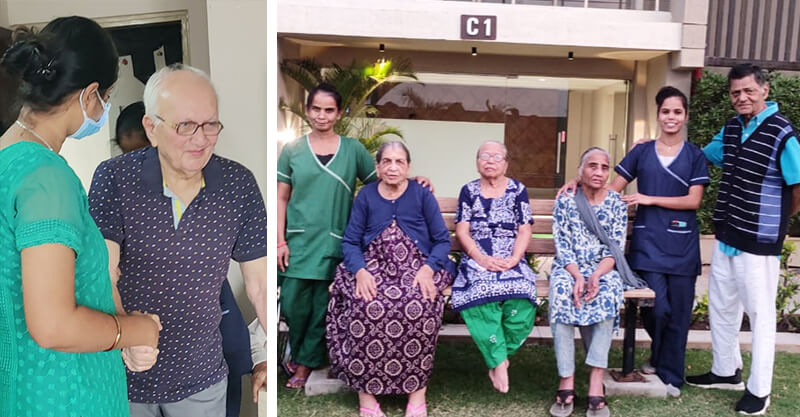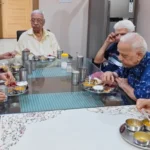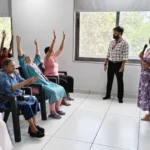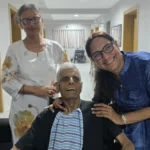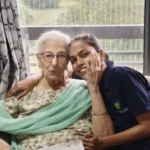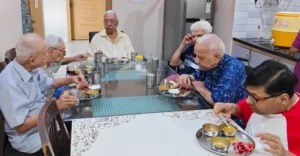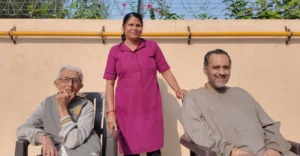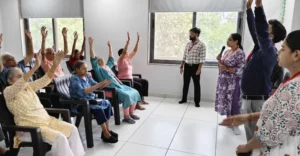Mental health has always been a reluctant discussion due to the stigma linked with such conditions. Various stressors that evolve with age, retirement, the drop in social-economic status, loneliness, depression, and isolation lead to different psychotic disorders. When these triggers merge with declining physical health, psychiatric issues start surfacing. Physical and mental health are symbiotic when it comes to affecting the body negatively.
Elderly psychiatric care or mental sickness is as natural as catching a cold or viral fever. What is required is a proper diagnosis by a certified medical professional so that possible interventions can be discussed with the facility to tackle it. Psychiatric care for elderly residents requires comprehensive assessments, systematic approaches, and treatment plans catering to their emotional, cognitive, physical, and social needs. These disorders may vary and get categorized under depression, anxiety disorders, bipolar disorders, psychotic disorders like schizophrenia, Alzheimer’s, and eating disorders. If untreated or undiagnosed, it can result in aggression, lethargy, suicidal feelings, poor diet, and poor quality of life.
How to recognize signs and symptoms of mental illness in elderly loved ones?
- Changes in personal hygiene: Wearing soiled clothes, living in unkept dirty rooms, not taking baths for days, and declining functional abilities signify the beginning of mental illness.
- Withdrawals, sleeping more, and keeping aloof: When they begin to shut themselves off from the world, not willing to get out of bed or being confined in rooms, getting anti-social is all signs of chemicals playing havoc with their minds.
- Changes in personality and mood swings: Feeling sad, tearful, emotional outbursts or fearing the worst, or carrying loads of guilt. This sudden personality shift is often a trigger warning.
- Loss of appetite and sleep issues: Good sleep is always a sign of good health, but constant sleep deprivation causes physical ailments. Also, sudden loss of appetite is a sure sign of ignoring oneself.
- Loss of interest in activities: Keeping self-aloof, not participating in any activities, and not being comfortable in a crowd could be a sign of depression.
- Changes in vital signs: Fluctuating BPs, irregular heartbeats, different coloured urines, and erratic bowel movements is often an indicator of something deeper going wrong with the body.
What are the unique challenges of providing psychiatric care to the elderly at home?
- With more and more families going nuclear, the likelihood of someone being around all the time to monitor is rare. Also, spending quality time is a near impossibility with hectic work schedules. Even hiring caregivers does not give peace of mind to families due to staff absenteeism or lack of commitment.
- In the case of aggressive behaviors, it is always concerning with little children around, as they may get affected or neighbors get hassled by the shouting or abuse.
- Patients with Dementia or Alzheimer’s often tend to wander off with no memory of it returning, so safety and security are primary concerns. At home, it gets challenging to manage the loopholes.
- Managing them medically, physically, and emotionally requires experience, expertise, and a systematic approach. At home, we often don’t get it right as high on emotions, plus it’s very exhausting to take care of immobile or mentally unstable seniors.
- Older folks, often with psychiatric care, need medical care for their physical ailments, which is an integral part of growing up and offering both, overburdens the family, as they have a house and expenses to keep running.
- Psychiatric care patients have peculiar demands and varying needs, like dim lights, sound sensitivity, refusal to bathe, rigidness to follow routines, etc. It is hard to cater to it when staying in a family setup.
Why is PapayaCare the best option for senior psychiatric care?
PapayaCare in Ahmedabad has recently moved into its new premises near Kalol and is one of its kind assisted Living facility in Ahmedabad. They offer retirement care homes and post-hospital recovery with expertise in senior psychiatric care. The team is mature and experienced in handling different situations involving psychiatric care. Activity schedules are tailor-made, considering their limitations to follow through. The aim is to direct their minds towards something they will focus their energy and senses on. Medical monitoring and nurses are around round the clock to administer medicines on time, check vitals and manage doses to calm their nerves when found necessary by their certified doctors. Caregivers and coordinators help with all assistance like feeding, bathing, cleaning, grooming, etc. Every treatment protocol is in consultation with their respective doctors. Food is nutritious and homemade, keeping their dietary requirements in mind, solid or semi-solid. The infrastructure is under surveillance cameras and has safety doors for floors with psychiatric care residents.
Conclusion
Psychiatric diagnosis isn’t a curse but an inevitable part of life, thanks to factors like genetic, internal, or external. Diagnosis in time is a blessing so that the family can come together in managing the elderly care mental health in a better way that slows down or improvises their condition. An assisted living facility is the solution for long-term senior psychiatric care which not only takes care of their primary need of food, care, hygiene, and comfort but also takes care of emotional leads and brings them out of the isolated zone.

